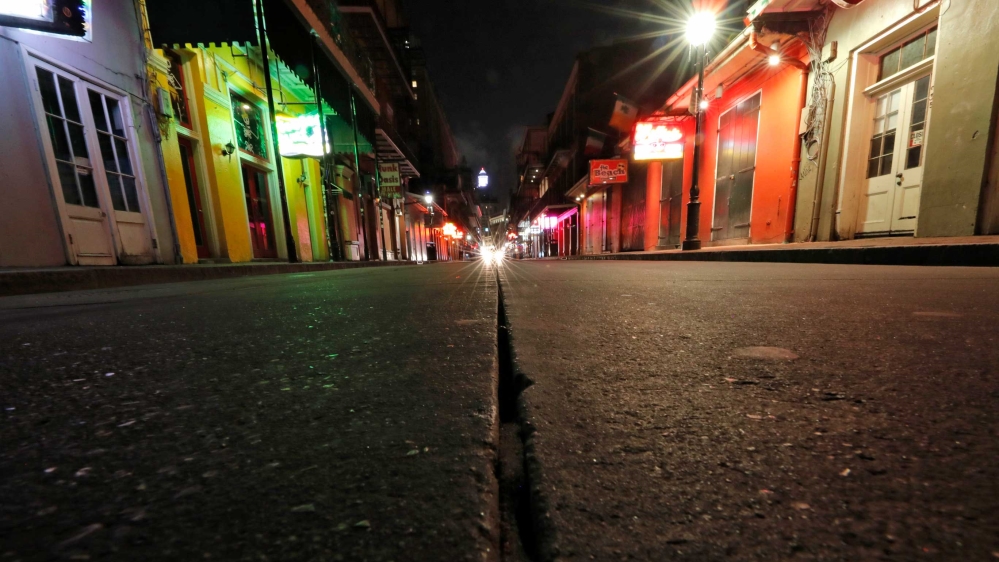Louisiana emerging as the next US coronavirus hot spot
State officials say they could run out of ventilators and hospital beds by next week as they compete for federal funds.

As the number of confirmed coronavirus infections in the United States surpassed 100,000 on Friday, the state of Louisiana emerged as a new hot spot amid a surge in hospitalisations and looming shortages of supplies, staff and hospital beds.
More than 2,300 people in the state have tested positive for COVID-19 and 119 people have died, according to the Louisiana Department of Health. More than 700 people have been hospitalised in the southern state and nearly 300 are on ventilators.
Keep reading
list of 3 itemsTrump signs $2.2 trillion coronavirus rescue package
Coronavirus: All you need to know in 500 words
Rebekah Gee, a former state health secretary now on the faculty of the medical school at Louisiana State University (LSU), said Louisiana medical facilities will soon run out of ventilators and protective equipment if more are not provided soon.
“By April 2 we will run out ventilators and by April 7, we will run out of beds if current capacity is maintained and not expanded,” Gee told Al Jazeera.
Louisiana Governor John Bel Edwards imposed several social distancing measures on Sunday, including a stay-at-home order, which requires most residents to limit their movements beyond essential needs such as buying groceries and going to medical appointments until at least April 12.
“Now, more than ever, we need the people of Louisiana to stay home, stop the spread and save lives,” Edwards said in a tweet at the time.
“There simply are not enough healthcare resources to care for all those who will need care if we continue to develop cases at our current pace,” Edwards said during a news conference on Thursday.
“It‘s not conjecture, this isn‘t some flimsy theory, this isn‘t a scare tactic,“ he said. “This is what‘s going to happen.“
A one-pager from @LouisianaGov on the statewide stay-at-home order. It takes effect at 5 p.m Monday.https://t.co/R7EnbdQeTl pic.twitter.com/nc484C2ooC
— Louisiana Department of Health (@LADeptHealth) March 22, 2020
Mardi Gras to blame?
Many experts believe the surge in infections in the state can at least be partially blamed on last month’s Mardi Gras celebrations in New Orleans, which drew 1.4 million revelers.
“My assumption is that during Mardi Gras, we already had people who were infected with the new coronavirus and then they spread it through the population,” said Susanne Straif-Bourgeois, a specialist in infectious diseases at the LSU School of Public Health.
“It’s very crowded, very dense and very close contact with a lot of people with parades and parties,” Straif-Bourgeois told Al Jazeera, “I think this contributed to the spread of the disease.”
Orleans Parish, which is home to part of New Orleans, has the highest coronavirus death rate per capita in the world, according to The New York Times.
New Orleans Mayor LaToya Cantrell said she would have cancelled Mardi Gras if the federal government had issued any directives at the time.

“If we were given clear direction we would not have had Mardi Gras and I would’ve been the leader to cancel it,” Cantrell told CNN. “No red flags were given, so absolutely, we moved forward.”
Experts say the social distancing measures that have since been imposed have not been in place long enough to lower the rate of infections and hospitalisations.
According to the US Centers for Disease Control and Prevention (CDC), the incubation period for the coronavirus – the time between when a person contracts the contagious respiratory illness and starts to show symptoms such as fever and a cough – is between two and 14 days.
Louisiana officials have identified COVID-19 “clusters”, defined as two or more coronavirus cases that appear to be connected, in at least eight nursing homes that house the elderly, according to local media.
For most people, contracting the coronavirus only leads to mild or moderate symptoms, but for some, especially the elderly and those with underlying health issues, the virus can lead to serious illness including pneumonia.
Unlike hurricanes, coronavirus affects entire country
US President Donald Trump approved a major federal disaster declaration for Louisiana on Tuesday, freeing up federal funds and resources. Trump has also agreed to set up two federal field hospitals to treat patients in the state.
Trump on Friday signed a $2.2 trillion emergency stimulus package that will provide billions of dollars to state and local governments, as well as support to hospitals to help fight the virus. But it is still unclear how the funds will be distributed.

Louisiana is no stranger to disasters, often having to contend with devastating hurricanes, including the 2005 Hurricane Katrina that killed more than 1,800 along the Gulf Coast. But Alexander Billioux, assistant secretary at the Louisiana Office of Public Health, recently said that unlike hurricanes, which often affect just one state or region, the coronavirus pandemic has affected the entire country, putting a strain on available resources.
New York remains the country’s epicentre, with more than 44,800 confirmed cases. California, Washington state and New Jersey have also been hit particularly hard.
“In a natural disaster, we can look to our neighbours. A hurricane doesn’t hit the entire Gulf Coast or the entire country, and the federal government and our neighbouring states are able to muster and give us supplies,” Billioux told CNN.
“Right now, we may be and we are the second or third highest rate of infections per capita, but the virus is spread all over this country.”